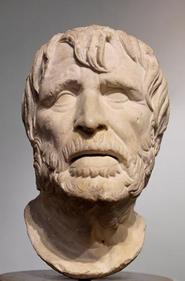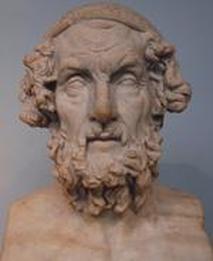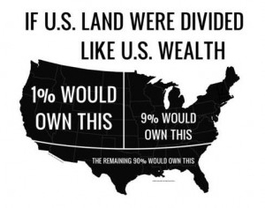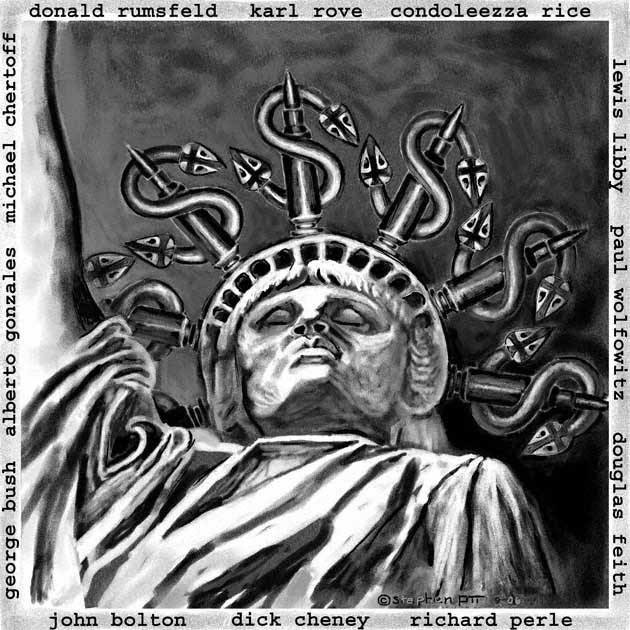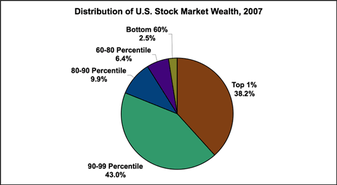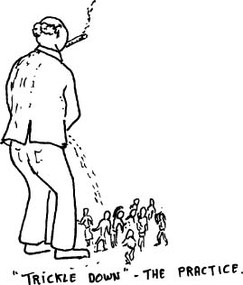Capitalism is the Ideology of the PleonexicThose who unreservedly accumulate are some of "the least human among us." They have a sickness which disables them from ever being satisfied. It is a sickness that gives them power--because it's pursuit is their primary pursuit they become accomplished and build our world to their measure. In order to save ourselves from the contagion we must first become aware of the illness, have compassion for its sufferers and reject everything they stand for: material growth, accumulation, penury wealth and comodification of all things from nature to human relationships.
|
To the afflicted ideologues: We don’t want what you’re selling, we don’t want to borrow from you, we don’t want to work for you and we don’t want to study what you think is important. We don’t aspire to be you. We repudiate you. May the house you built fall and may we welcome you into a house built by humanity flourishing in its place.
|
If you’ve read our essay, Are You a Capitalist? in the Capitalism Critiqued section you came across the word pleonexia...
In this section we hope to give you a full understanding of what that word means employing both a historiography and a philosophical analysis. By way of introduction pleonexia is an imbalance suffered by individuals that destabilizes individuals, society and the natural world. It is a sickness, a form of psychopathy. Pleonexia is a Greek word often translated as greed, but better understood as the insatiable desire to acquire, accumulate or obtain more of anything, whether money, property, power or what have you. It is the imbalanced state of never being satisfied. Thus those suffering most from pleonexia mirror the singular attribute of capital: reproduction. Indeed capital can be thought of as the modern synthetic construction that enables the affliction to thrive. As capital can never rest, so too the pleonexic is never sated—and so the affliction creates the conditions necessary for itself. Greed is often limited to the idea of wealth and so, as will be shown, is inadequate if we want to get a full grasp on our social condition...
Was Odysseus a pleonexic? ...So think about this…the Iliad recounts a ten year war,
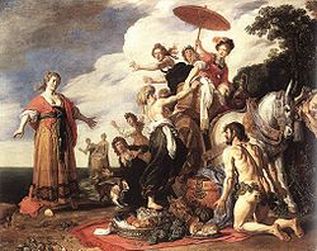 Odysseus before Nausikaa
Pieter Lastman 1619 (Wiki)
in which countless left their homes and families and whatever idyll they would have managed to built for themselves, only to suffer and die, sparked by one man’s love for one woman. Unwilling at first, but then they choose. Some say it is the most violent story ever told, even down to this day. Is the Iliad a great tale of love, contest and struggle? Yes. Is the Odyssey a great tale of courage, and mental and physical ability to battle one’s enemies and to overcome adversity? Yes. But it also seems the Iliad is a commentary on the futility of war, at a minimum, and likely the hopelessness and unpredictability of love, to which a wiser person might acquiesce. Maybe Homer thinks so: safely back with Menelaus after the war, Helen recalls with some embarrassment the time, “…when all you Achaeans (Greeks) fought at Troy, launching your headlong battles just for my sake, shameless whore that I was.” (Emphasis original, 4.160-63 Fagles...and if you’re not laughing you should read that line again).
Read the full essay here To be aware of affliction enables the awareness of health and compassion for sufferers.
|
Inequality.org
|
George Carlin--The American Dream: "You have to be asleep to believe it."
"A short excerpt from the video 'Life is worth Losing.'" (2005)
Editor's Note:
Need an essay on how the pleonexics embedded "survival of the fittest" into our language--how evolution was co-opted...part of the Lazy Lion on the Savannah? (Banquet at Del Monico's, Jacobs, et al)
Susan George, Chair of the Board of the Transnational Institute....on insatiety and Adam Smith
“'At this point in the discussion, especially when one is speaking to concerned, engaged, decent people like those likely to be found at a Schumacher lecture, someone will raise two highly pertinent questions. The first is this: 'Isn't there a point where people with huge fortunes say ‘enough is enough’ and start sharing?' Some do—Bill Gates and Warren Buffet are oft- cited examples. But as a class, I’m sorry to say that the answer is no. We know a lot about poverty lines but there is no such thing as a wealth line and the word “enough” is not part of the vocabulary of this class. You needn’t believe me. Listen to the expert who said 'All for ourselves and nothing for other people seems in every age of the world to have been the vile maxim of the masters of mankind.' That was not Karl Marx but Adam Smith, in his classic 1776 treatise on capitalism, the Wealth of Nations. Little has changed since then.'” (emphasis added)
Schumacher Lecture, Leeds, UK; 4 October 2008 'Transforming the Global Economy: Solutions for a Sustainable World’. Don't read this the wrong way...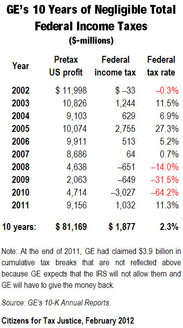
Of course GE should pay more in taxes--that is obvious to most of us. What you should see here is that GE is simply following the teleology of capital--it is doing exactly what it is supposed to be doing in the world it helped create--a world where capital has an ontological status apart from human beings. It is a pleonexic world of never-ending growth. Our revolution overthrows this tyranny by understanding and discarding the fiction. Until we do, any reforms will be short lived. Capital, and its pleonexic stewards, like GE's current CEO Jeffery Immelt, will eventually regain power, just like it has throughout history. How much power do the pleonexics have now? Consider that Immelt's predecessor Jack Welch is considered an icon, a status achieved by ruthlessly cutting jobs at GE, (meaning, displacing human beings) which within a pleonexic frame is considered necessary, natural and even more, laudable. And Immelt has been appointed our Job Czar by president Obama, an utter contradiction to anyone paying attention. During his tenure thus far, Immelt has eliminated tens of thousands of US jobs while creating even more overseas in low-wage countries. This is a process of caring for capital, but not for people. Contradiction is often a life-blood of dogma and ideology, and that is the case with capitalism.
|
"Greed will not only save Telldar Paper, but that other malfunctioning corporation called the USA."If this makes sense to you then you are probably suffering from pleonexia....
Greed is not exactly the same as pleonexia, but we can forgive Mr Gekko for a simple characterization of, and justification for, his mental illness. He is a psychopath. But today psychology generally does not recognize his illness as such--nor do most people. In fact, just the opposite: we call him successful. This is because we are trapped in a worldview circumscribed by capital; capitalism is an ideology masquerading as science. It is a system that rewards the least human among us--acquisitive competitors--and penalizes anyone and anything else. Today, psychology itself has become more an industry than a profession. Think about what this critical distinction means.
(See Psychopathy page for more) Working Class HeroThere's room at the top they are telling you still
But first you must learn how to smile as you kill If you want to be like the folks on the hill -John Lennon 1970 Hey, You! Mean People Earn More, Study Finds Rachel Emma Silverman, The Wall St. Journal 8.15.11
What possess the richest people in the world to want to posses so much? A mental illness, the affliction known as pleonexia for thousands of years. This affliction has found its most accomodative home in capitalism, an economic system that places competition above all else. Pleonexia has become expected behavoir so much so that the meanest people earn more money... |
The Goose and the Commons
The law locks up the man or woman Who steals the goose from off the common But leaves the greater villain loose Who steals the common from under the goose. The law demands that we atone When we take things we do not own But leaves the lords and ladies fine Who take things that are yours and mine. The poor and wretched don’t escape If they conspire the law to break; This must be so but they endure Those who conspire to make the law. The law locks up the man or woman Who steals the goose from off the common And geese will still a common lack Till we go and steal it back. -- 17th century protest against English enclosure laws |
It's a Wonderful Life resonates so widely...
because it touches deeply shared values about people helping people, in part by recognizing the disease from which Mr Potter suffers. When George Bailey says to Potter, "...to you, a warped frustrated old man, [people] are cattle..." he is identifying for us a man who won't be satisfied until he owns everything, until everyone "has to come crawling" to him. He is a man without empathy, who works to maintain a system without empathy that eventually leads to the near collapse of the Building and Loan. Thanks to the angel Clarence we see that without George Bailey, Potter's world would have come to pass-- where there once was community, Bedford Falls becomes a competitive free-for-all, a place where everyone looks out for their own interest. But George Baliey cannot save the town--he is in fact undone by Potter and ready to commit suicide. What saves Bedford Falls is the town-wide awakening of their common humanity, their deep compassion for each other and the man who symbolizes the nexus of that true wealth. Bedford Falls is saved only by empathic people uniting behind George Bailey, a symbol of their (and our) shared humanity.
Which archetype and world do you choose, Henry Potter, or George Bailey? This is not an idle, trivial or childish question. We have in fact chosen Potter's world--witness the power and hubris of bankers Lloyd Blankfein of Goldman Sachs and Jamie Diamond of JP Morgan Chase. They have constructed our world, a world of never-ending self interest. We must deconstruct that world and build anew. |
"The bank called our loan," says Uncle Billy to George Bailey as the people of...
Bedford Falls panic to retrieve their money from the now shuttered Builidng and Loan. Henry Potter had just bought the bank, itself in crisis, and is now using this opportunity to achieve his long sort after goal: to take over the Building and Loan. George calmly welcomes everyone in and when the people begin to demand their funds he offers perhaps the best lesson in economics ever given in popular culture. "You're thinking about this place all wrong," he tells the anxious crowd. "The money's not here." Then he goes around the room and calling each by name he tells them, "Your money's in Joe's house, that's right next to yours..." and yours and yours, "and a hundred others. You're lending them the money to build and then they're going to pay it back to you as best they can. What are you going to do, foreclose on them?" When someone announces that Potter is paying 50 cents on the dollar for all shares, George pleads with the crowd not to sell, that Potter wants everything in the town, he's "got the bank, the department store and now he's coming after us...We've got to stick together," he says. "We've got to have faith in each other."
That's what economics really is: a social system based on trust, mutual aid and mutual benefit. It is not a science that has found reality in competitive self-interested accumulation; and it sure as hell isn't an ism. (even George Soros, the famed international investor speaking at the INET conference in Berlin April 2012, is beginning to recognize this, although, unsurprisingly, he doesn't go far enough) Capitalism is an ideology, a construct, a pleonexic construct, favored by the pleonexics--those whose wants know no bounds. And they expect us to believe in their ism, work for and aspire to be them.
Choose: Henry Potter or George Bailey. Choose now. It really is as simple as that.
See: Public Banking link and research community banks and credit unions
That's what economics really is: a social system based on trust, mutual aid and mutual benefit. It is not a science that has found reality in competitive self-interested accumulation; and it sure as hell isn't an ism. (even George Soros, the famed international investor speaking at the INET conference in Berlin April 2012, is beginning to recognize this, although, unsurprisingly, he doesn't go far enough) Capitalism is an ideology, a construct, a pleonexic construct, favored by the pleonexics--those whose wants know no bounds. And they expect us to believe in their ism, work for and aspire to be them.
Choose: Henry Potter or George Bailey. Choose now. It really is as simple as that.
See: Public Banking link and research community banks and credit unions
Affluent People More Likely to be Scofflaws, by Yasmin Anwar
|
|
Avarice and Prodigality, Canto VII; Dante's Inferno
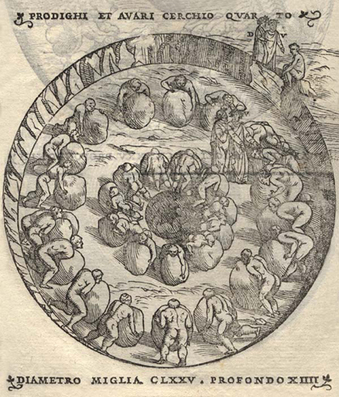
Dante's Inferno;
Canto IV, Fourth Circle of Hell
From Danteworlds Univ. of Texas at Austin:
Avarice--greed, lust for material gain--is one of the iniquities that most incurs Dante's scornful wrath. Consistent with the biblical saying that avarice is "the root of all evils" (1 Timothy 6:10), medieval Christian thought viewed the sin as most offensive to the spirit of love; Dante goes even further in blaming avarice for ethical and political corruption in his society. Ciacco identifies avarice--along with pride and envy--as one of the primary vices enflaming Florentine hearts (Inf. 6.74-5), and the poet consistently condemns greed and its effects throughout theDivine Comedy. Dante accordingly shows no mercy--unlike his attitude toward Francesca (lust) and Ciacco (gluttony)--in his selection of avarice as the capital sin punished in the fourth circle of hell (Inferno 7). He viciously presents the sin as a common vice of monks and church leaders (including cardinals and popes), and he further degrades the sinners by making them so physically squalid that they are unrecognizable to the travelers (Inf. 7.49-54). By defining the sin as "spending without measure" (7.42), Dante for the first time applies the classical principle of moderation (or the "golden mean") to criticize excessive desire for a neutral object in both one direction ("closed fists": avarice)and the other (spending too freely: prodigality). Fittingly, these two groups punish and insult one another in the afterlife. danteworlds.laits.utexas.edu Circle 4, canto VII
Avarice--greed, lust for material gain--is one of the iniquities that most incurs Dante's scornful wrath. Consistent with the biblical saying that avarice is "the root of all evils" (1 Timothy 6:10), medieval Christian thought viewed the sin as most offensive to the spirit of love; Dante goes even further in blaming avarice for ethical and political corruption in his society. Ciacco identifies avarice--along with pride and envy--as one of the primary vices enflaming Florentine hearts (Inf. 6.74-5), and the poet consistently condemns greed and its effects throughout theDivine Comedy. Dante accordingly shows no mercy--unlike his attitude toward Francesca (lust) and Ciacco (gluttony)--in his selection of avarice as the capital sin punished in the fourth circle of hell (Inferno 7). He viciously presents the sin as a common vice of monks and church leaders (including cardinals and popes), and he further degrades the sinners by making them so physically squalid that they are unrecognizable to the travelers (Inf. 7.49-54). By defining the sin as "spending without measure" (7.42), Dante for the first time applies the classical principle of moderation (or the "golden mean") to criticize excessive desire for a neutral object in both one direction ("closed fists": avarice)and the other (spending too freely: prodigality). Fittingly, these two groups punish and insult one another in the afterlife. danteworlds.laits.utexas.edu Circle 4, canto VII
Christ knew the trap well...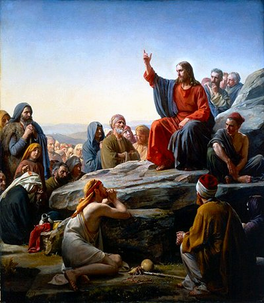 Sermon on the Mount, Carl Bloch
(1834-1890)
A Homily by Rev. Christopher M. Mahar
"Have you ever been diagnosed with the disease or illness called Pleonexia? This may be the first time you even heard of Pleonexia, but by no means is it a rare disease. In fact, it is something that affects almost every single one of us, directly or indirectly. The illness of Pleonexia is something that can destroy individual lives, families, and even countries; it is a plague that has, in the course of human history, wiped out entire cultures! St. Paul uses the word Pleonexia in our second reading from the Letter to the Colossians. Jesus strongly cautions us against it in the Gospel. He says: Take care to guard against all pleonexia. —Luke 12:15 You may have guessed by now, but Pleonexia is the Greek word translated in our Scriptures this weekend as greed or avarice, and it is taken from the word pleon, which means “more.” Basically Pleonexia, or greed, is the desire for more, more, more. It drives us on to desire more money, more possessions, more sex, more power. More. It’s the “more” disease. Pleonexia has the uncanny ability to root us right here to this earth, and blind us to the things of heaven. It creates a false sense of happiness in a life here without God, and takes our attention from the Kingdom of God that each of us are called to embrace. That is why Christ is so adamant in that Gospel to warn us against it...." 18th Sunday in Ordinary Time-Year C; Homily 5 August, 2007, St. Mary's Church, Cranston, R.I.Colossians 3:1-11 and Luke 12:13-21 |
|
War and pleonexia are symbiotic, each feeding the other in a never ending spiral of self and planetary destructionThe Stock Market Doesn't Represent You
When you hear that as much as two thirds of Americans have money invested in the stock market, believe that... But then ask the next question: Who owns how much? As the chart below shows the top 10% of the population owns over 80% of the wealth in the market. This is an amazing concentration of wealth that begs another question: Whose interests then, does the stock market represent? Not yours. Keep thinking about this--how much media coverage the market garners; how much and how often politicians and policy makers use it as a benchmark...keep thinking about this...At some point it might dawn on you that you are not really part of the economy or the political process...other than a cog...And then it might occur to you that those with all that accumulated wealth likely suffer from pleonexia...an inability to be satisfied. Mary Poppins: Lessons found in pop-culture
In the first clip, Mr Banks brings his children to deposit their tuppence to begin their assimilation into capitalism. More than skeptical of the chairman of the bank, a decrepit old man their father calls "a giant in the world of finance," the children insist that they want to feed the birds with their money. With Malthusian conviction, the chairman tells the children that's "nonsense...feed the birds and what have you got? Fat birds." All the singing and cajoling proffering "conquest and affluence and achieving a sense of stature" doesn't convince the children. "Think of the foreclosures!" says the chairman excited by the profit to be had. After proudly declaring the symbiotic state-finance nexus, "Where stands the banks of England, England stands...where fall the banks of England, England falls," the chairman swipes the tuppence from the children prompting a tussle to get it back, all of which ignites a run on the bank.
We are, all of us, trapped in this economy, the world-view shaped by pleonexia.
|
Artists: Jane and Eden; Lyrics by Eden Roemer; Music by Jane Jensen; Editor: Billy Vegas
Why we must resist..."America can yet be a dream fulfilled..."
"What we need in this country is love and wisdom and compassion for one another...and a feeling of justice towards those that still suffer..." RFK
"We can create our world. We don't need commercial banks...such thieving middle-men...
We can win freedom and prosperity for our future. It's all a matter of our own will and energy... America can yet be a dream fulfilled..."
puppetgov.com
"We can create our world. We don't need commercial banks...such thieving middle-men...
We can win freedom and prosperity for our future. It's all a matter of our own will and energy... America can yet be a dream fulfilled..."
puppetgov.com
